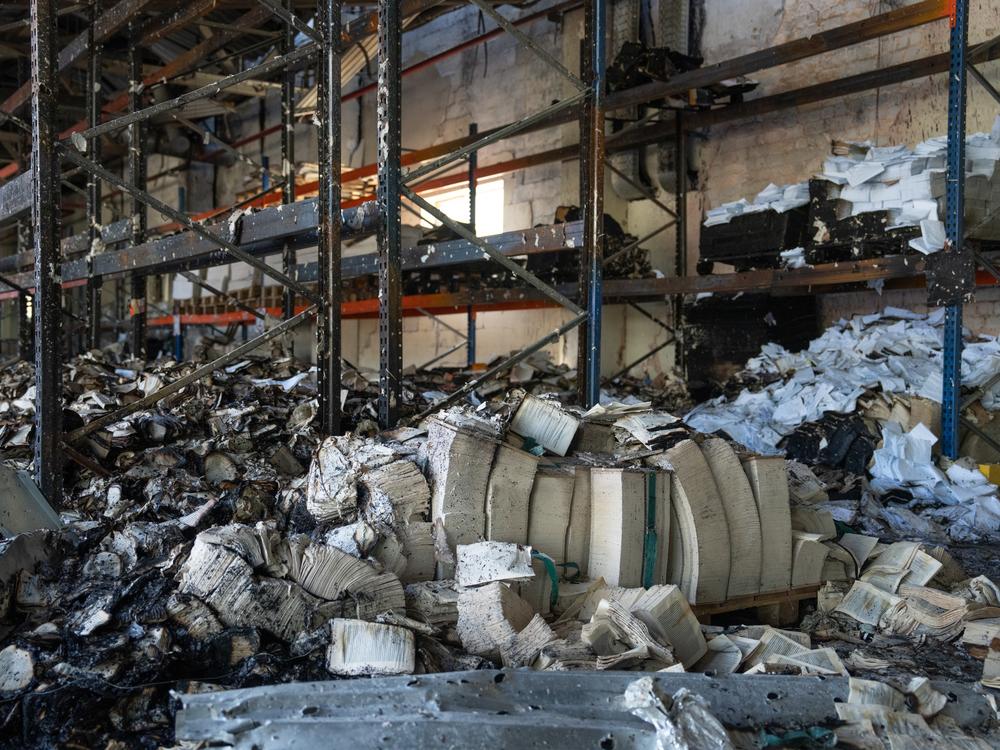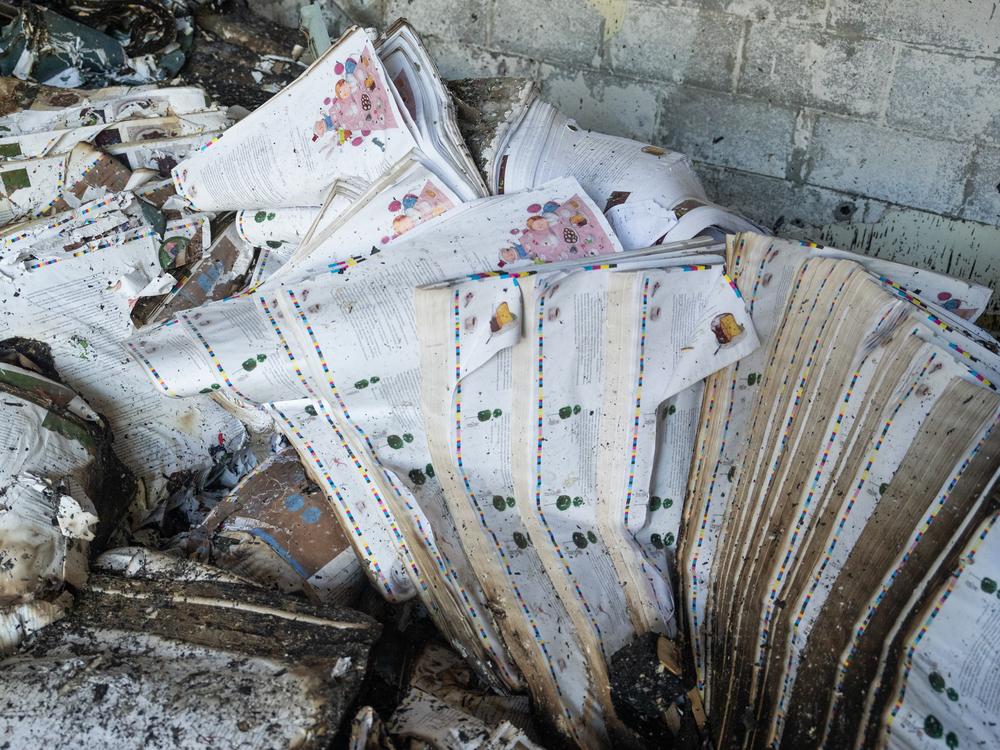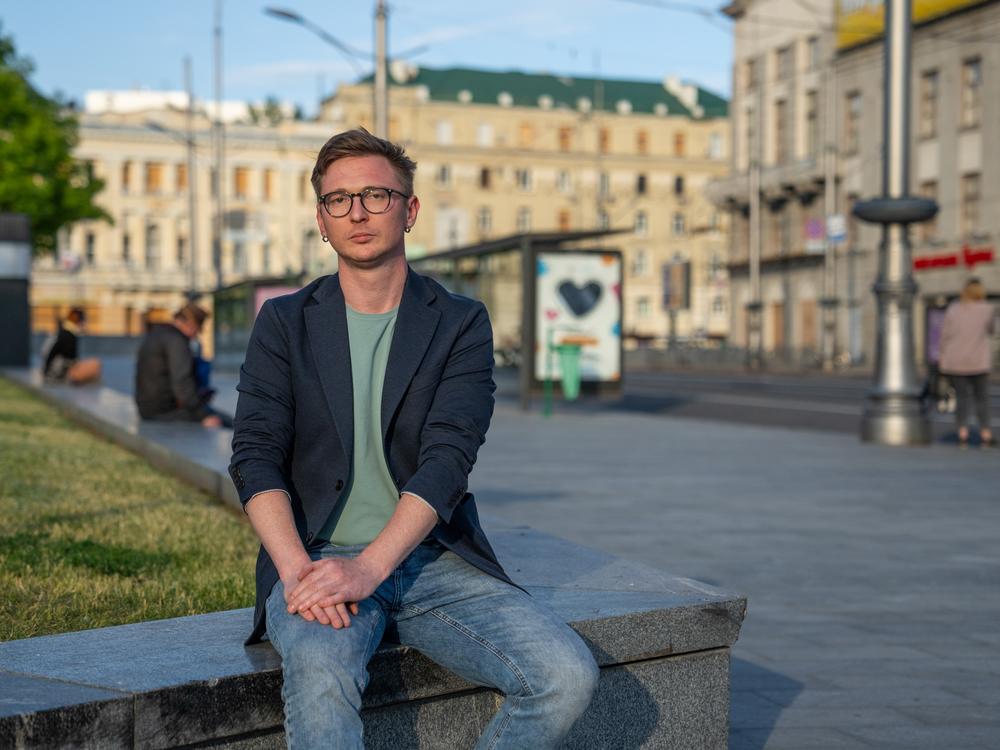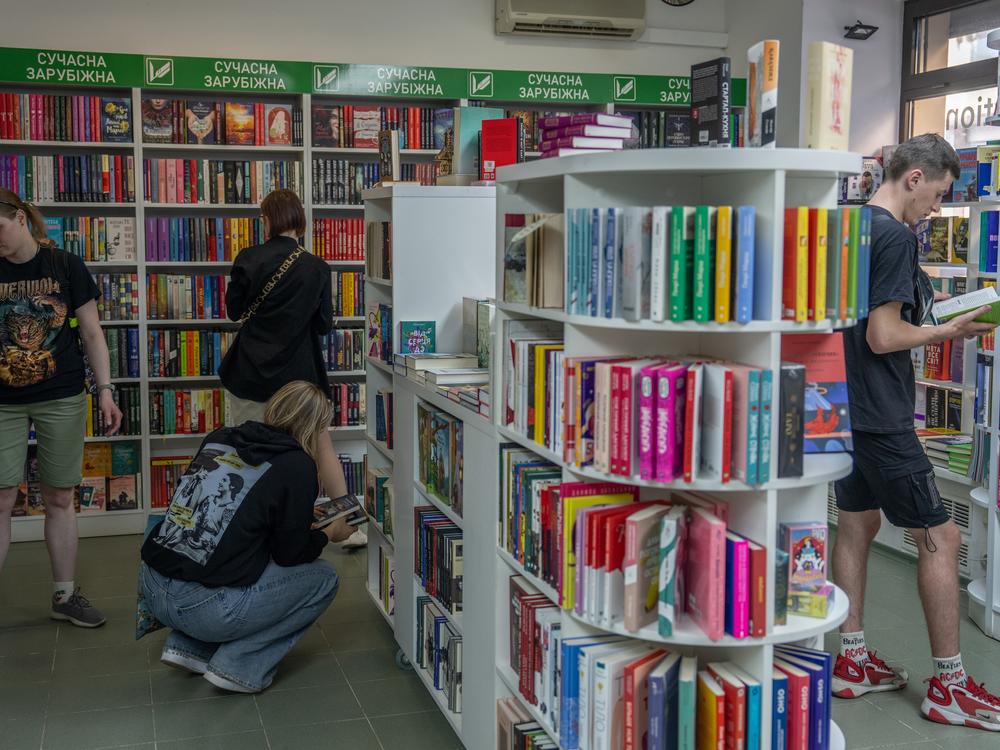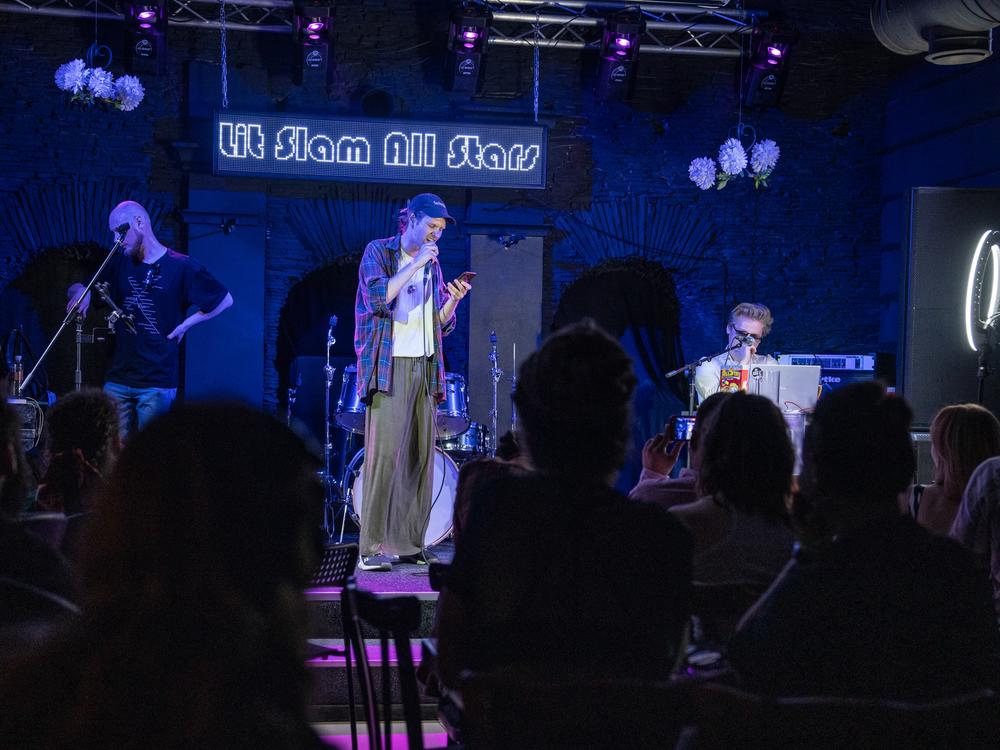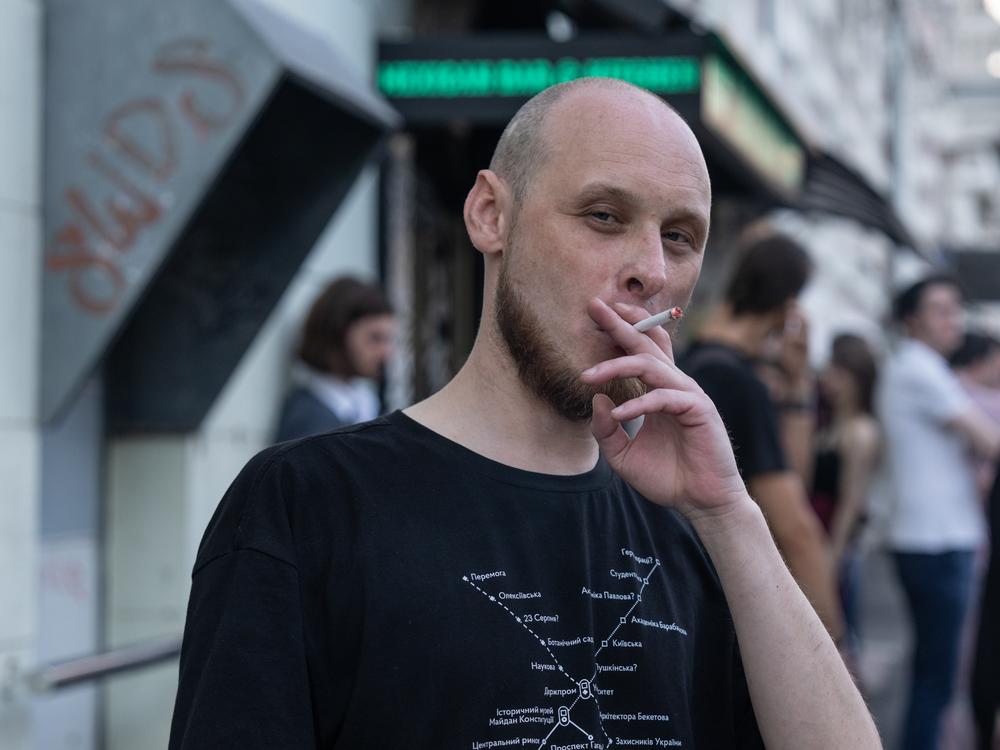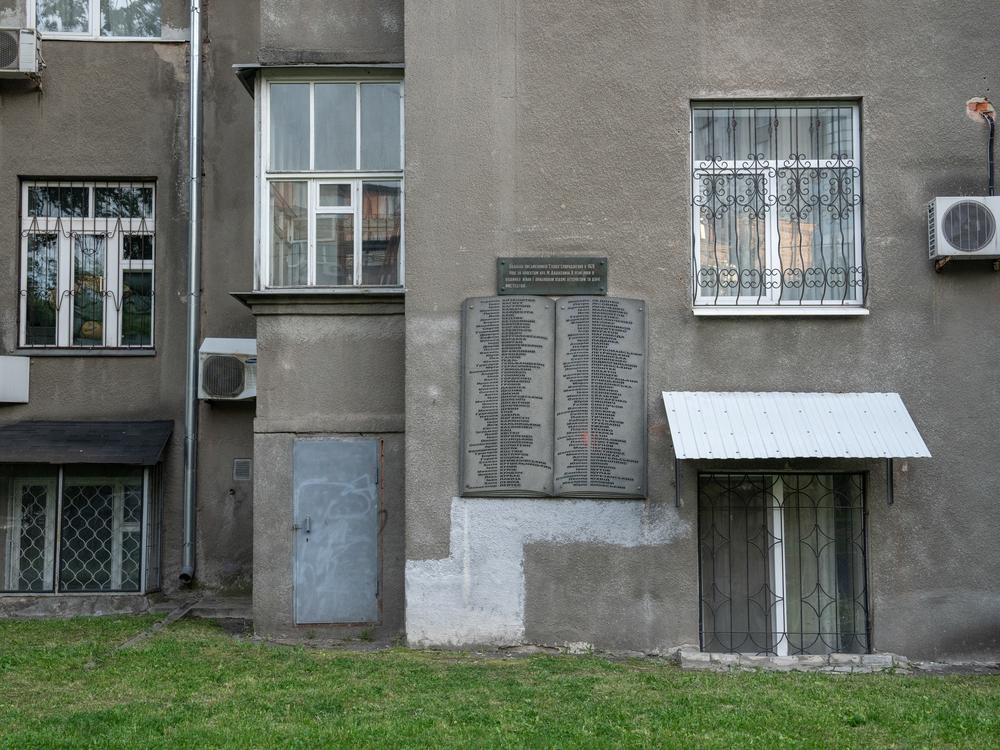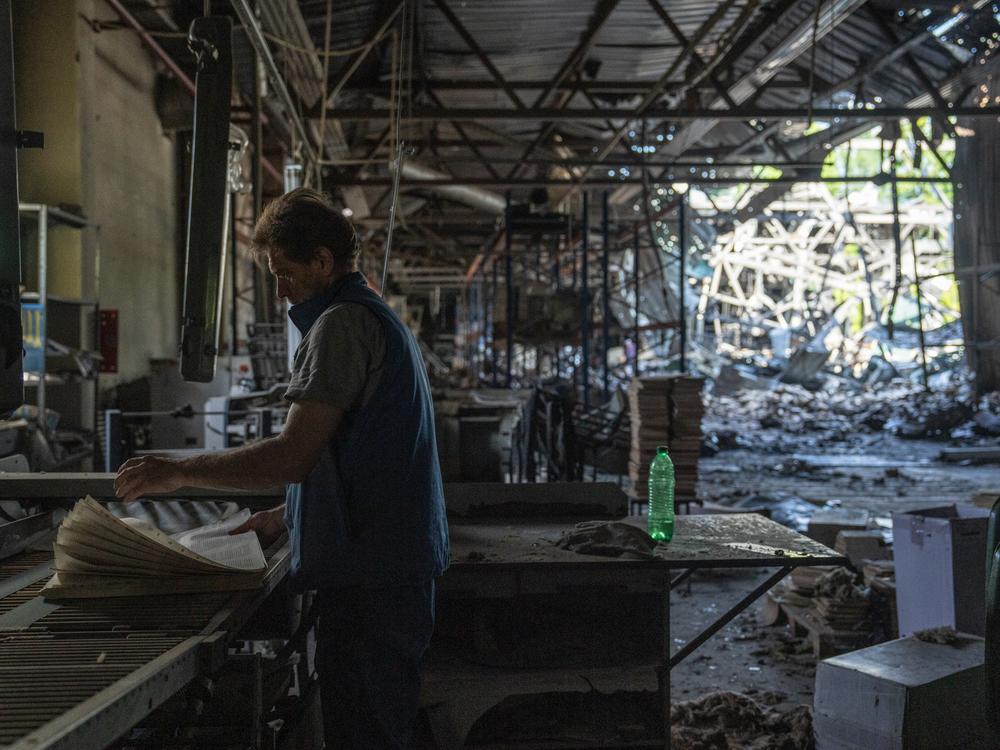Section Branding
Header Content
Ukraine's bookstores are thriving, but a top printing plant took a deadly hit
Primary Content
KHARKIV, Ukraine — After a Russian missile strike in May, one of Ukraine’s largest book-printing plants looked like a massacre.
Seven employees were dead, with more than 20 wounded, their blood on the walls that had not blown apart. And under a caved-in roof lay tens of thousands of charred books and printing machinery in smoldering heaps.
“Most of the books were ours,” says Artem Litvinets, editor-in-chief of Vivat, a major Ukrainian publishing house. “The attack felt methodical and deliberate, like cultural genocide.”
About 80% of Ukraine’s books are printed in Kharkiv, the country's second-largest city, which is just 20 miles from its northeastern border with Russia. Publishing has thrived even as Kharkiv has been under constant attack since Russia launched its full-scale invasion in February 2022.
The Ukrainian Book Institute told NPR that bookstore chains have opened dozens of new stores in the past year alone and that independent bookshops such as Sens, in Kyiv, are thriving. Ukraine’s largest bookstore chain added 22 new stores in 2023 and plans to add another 22 this year. Litvinets says Vivat, which is based in Kharkiv, has doubled its staff and book stock since the war began and tripled the number of bookstores from three to nine.
“And now, with all the power cuts, when there’s no electricity or internet, books are even more popular,” he says. “People read them by flashlight or candlelight and escape into another world.”
Litvinets says mysteries and romantic fiction are especially popular; Ukrainian authors are in high demand.
“Since the war, there’s this interest in everything Ukrainian,” he says, “and that includes Ukrainian literature.”
'Don’t stop! Survive!'
Inside one of Vivat’s bookstores in Kharkiv, Kuzma Zhytnyk, an 18-year-old economics student, is perusing the colorful, well-stocked shelves. He says checking out the latest releases at the bookstore is part of his everyday routine.
“I love sitting on the sofa at home and leafing through a book,” Zhytnyk says. “It drives away bad thoughts.”
He selects the Ukrainian-language edition of Why Nations Fail by Daron Acemoğlu and James Robinson. Zhytnyk constantly worries about what will happen to Ukraine, he says, and wonders if it will lose its sovereignty and defined borders as well as “a national idea that holds everyone together.”
“In order to save the country, we need to save our minds,” he says.
Though many in Kharkiv spoke primarily Russian before 2022, not a single book in Vivat’s collection is in Russian. “We have totally rejected the Russian language, which Russia has used as a weapon to extinguish the Ukrainian language,” says Litvinets, the Vivat editor.
At a colorful Mexican bar and restaurant in Kharkiv, poets are performing verses in Ukrainian at a popular poetry slam. Artem Elf, founder of the event, called Lit Slam UA, says Russians do not accept that Ukrainians “have our own culture, our own artists who are not connected to Russia. They don’t want to admit we exist.”
One of the poets, 18-year-old Yulia Lypneva, says Russia’s war on her country has made her poetry darker and sharper. She recites a poem about smoke covering “the broken edge of Kharkiv’s heart.”
“Don’t stop! Don’t die! Survive!”
Echoes of the Executed Renaissance
Lypneva says she and other young Ukrainian writers want to fill the void left by writers killed by Russian forces. They include Volodymyr Vakulenko, a beloved children’s author, and Victoria Amelina, an award-winning novelist, poet and essayist. Russian paramilitaries executed Vakulenko near his home in northeastern Ukraine in March 2022 and threw his body in a mass grave.
Amelina, who helped find and promote Vakulenko’s war-time diary, was killed in a Russian strike on a pizzeria in the eastern Ukrainian city of Kramatorsk last summer. Another poet, Maksym Kryvtsov, was killed in action in January while serving in the Ukrainian military.
Ukrainians often compare the losses to the Executed Renaissance, a literary generation murdered by the Soviets almost a century ago. More than 200 Ukrainian writers were arrested in the 1920s and 1930s, and many were killed.
The repression prompted Ukrainian novelist Mykola Khvylovy to take his own life in 1933 in the Slovo House, an apartment building in Kharkiv where Soviets relocated writers in order to spy on them.
The building still stands in Kharkiv today. One apartment is used by Kharkiv’s Literary Museum for writer residencies. At the museum, which is devoted to Ukrainian literature, director Tetyana Pylypchuk picks up a book by Khvylovy that’s part of an ongoing exhibition about the war.
“He forces us to think that even our own memories are not what we think they are,” Pylypchuk says.
She gives an example. When Pylypchuk was a child, her mother used to read her fairy tales by the Russian writer Alexander Pushkin.
“These became my warm emotional memories, and this is how I perceived Pushkin and Russian,” she said. “It took me a while to see that we did not have an emotional connection to Ukrainians writers because this connection was not allowed to develop.”
Before the war, she says, Ukrainians could choose whether to identify with either Russian or Ukrainian culture.
But now that choice is a “question of life and death.”
'Words and bullets'
Russia continues to attack Ukraine with missiles and glide bombs. Serhii Polituchyi, who owns the Factor Druk book-printing plant destroyed by a Russian missile in May, says that has not deterred him from plans to reopen the plant. Ukrainian Economy Minister Yuliia Svyrydenko said the foundation of U.S. businessman and philanthropist Howard Buffett would finance its rebuilding.
“Kharkiv is and will continue to be Ukraine’s capital of publishing and printing,” Polituchyi says.
The attack destroyed copies of Words and Bullets, a collection of interviews with writers on the war’s frontlines, including Amelina and Kryvtsov, who were both killed. The book was set to be released last month.
Instead, the burned copies were included in a somber exhibit at Kyiv’s Book Arsenal in May. The display was simply titled: “Books Destroyed by Russia.”
NPR producer Hanna Palamarenko contributed to this report from Kyiv.
